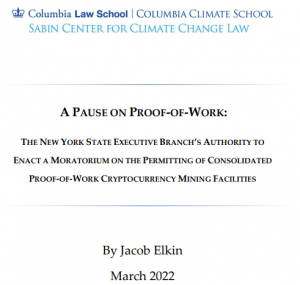By Jacob Elkin
As cryptocurrency has increased in popularity and cryptocurrency mining facilities have expanded their energy consumption, some fossil fuel power plants in New York have ramped up energy generation to provide behind-the-meter power to cryptocurrency miners. Increased power generation to fuel cryptocurrency mining has significant environmental impacts, leading to greenhouses gas emissions that may threaten the state’s emission reduction targets. Local governments across New York have responded with moratoria on the siting of new cryptocurrency mining facilities, and bills have been introduced in the New York State Senate and the New York State Assembly to establish a three-year moratorium on new or renewed permits for electric generating facilities that utilize carbon-based fuels and that provide behind-the-meter electric energy to proof-of-work mining facilities.
In a white paper published today, the Sabin Center for Climate Change Law argues that the New York State Executive Branch currently has legal authority under the State Environmental Quality Review Act and the Community Protection and Climate Leadership Act to pause the permitting of such facilities while the Department of Environmental Conservation analyzes the facilities’ impacts through a generic environmental impact statement. In addition to analyzing the statutory bases for such a moratorium, the white paper assesses potential legal challenges that may be brought in response to it, concluding that those challenges would not carry particularly strong legal weight. The white paper also notes that a state permitting moratorium would likely not reach mining facilities that receive all of their energy from the grid; the paper outlines potential legislative approaches to initiating state regulation of those facilities, along with relevant policy considerations.
The white paper was written by Climate Law Fellow Jacob Elkin. Read the white paper here.
Jacob Elkin is a Renewable Energy Legal Defense Initiative Fellow at the Sabin Center.





